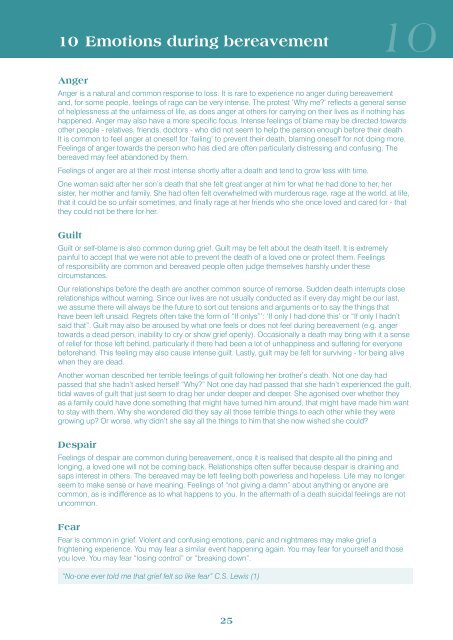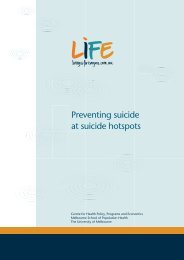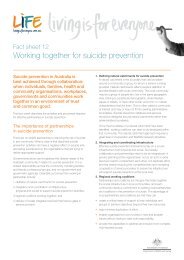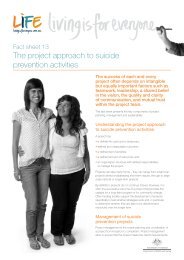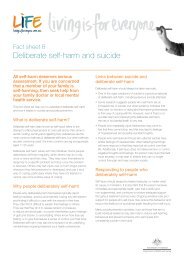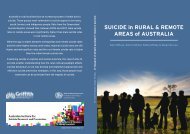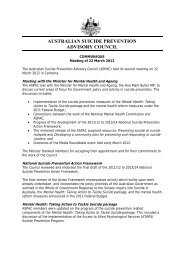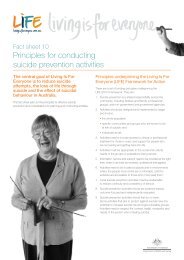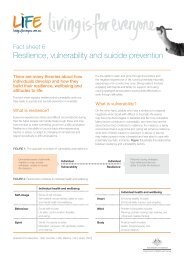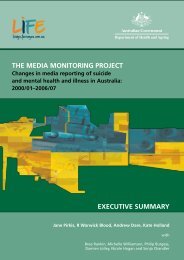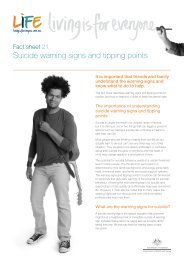9 Early grief and mourning9ShockThe death of someone close to you comes as a tremendous shock. When someone dies unexpectedly th<strong>is</strong>shock <strong>is</strong> intensified and when someone takes their own life, or dies in a violent way, the shock can be particularlyacute. Shock <strong>is</strong> common during the days and weeks immediately following a death. Some experience it moreseverely and <strong>for</strong> longer than others.NumbnessYour mind only allows you to feel your loss slowly, and following the death of someone you have been close toyou may experience feelings of numbness. What has happened may seem unreal or dreamlike. The thought ‘th<strong>is</strong>can’t really be happening’ may recur. The numbness of early bereavement may itself be a source of d<strong>is</strong>tress andm<strong>is</strong>understanding if one wonders, <strong>for</strong> example, why one cannot cry at the funeral. In fact, th<strong>is</strong> numbness <strong>is</strong> onlydelaying emotional reactions and may be a help in getting through the practical arrangements. The ‘protection’provided by shock gradually wears off and emotional pain begins.D<strong>is</strong>beliefIt <strong>is</strong> natural to have difficulty believing what has happened. Where a death was untimely and sudden it <strong>is</strong> evenharder to grasp that the loss <strong>is</strong> permanent and real. On one level it <strong>is</strong> possible to “know” that a loved onehas died. But on another, deeper level it may seem impossible to “accept”. A large part of you will res<strong>is</strong>t theknowledge that the person who has died <strong>is</strong> not going to be around any more. Confusion, panic and fear arecommon during th<strong>is</strong> struggle between “knowing” they have died and d<strong>is</strong>belief.SearchingNumbness and shock tend to give way to an overwhelming sense of loss. Many bereaved people findthemselves instinctively “searching” <strong>for</strong> their loved one, even though they know that they are dead. Th<strong>is</strong> mayinvolve calling their name, talking to their photographs, dreaming they are back or looking out <strong>for</strong> them amongstpeople in the street. Th<strong>is</strong> denial of a painful reality <strong>is</strong> a natural part of mourning. Real<strong>is</strong>ing that a death has reallyhappened and <strong>is</strong> irreversible takes some time.“Denial <strong>is</strong> meeting your son on the street, seeing him from behind, the same shaped head, the identical droopof the shoulders, the swinging gait. Your leaping heart cries, “Oh, it’s Mitch!”. Some days, you’ll walk into thehouse and ‘feel’ h<strong>is</strong> presence in a room. You can ‘see’ that smile, ‘hear’ that laugh. A part of my denial wassetting the table <strong>for</strong> him. Time and again, I’d set h<strong>is</strong> place with all the others and then gasp with the real<strong>is</strong>ationthat he would never be coming home to dinner.” (1)Angu<strong>is</strong>h and piningThe understanding that a loved one <strong>is</strong> really dead brings with it tremendous m<strong>is</strong>ery and sadness. As the lossbegins to make itself felt, pining <strong>for</strong> the person who has died <strong>is</strong> common. Powerful and desperate longings - tosee and touch them, to talk and be with them - may be felt. The intensity of emotions <strong>is</strong> often frightening andmay leave the bereaved feeling devastated. Emotional pain <strong>is</strong> often accompanied by physical pain. It <strong>is</strong> commonto go over and over what has happened, replaying things in your head or talking them through. The need to talkabout a loved one, following their death, <strong>is</strong> part of the natural struggle to counteract their loss.Physical and emotional stressLosing someone close to you <strong>is</strong> a major source of stress. Th<strong>is</strong> stress may show itself in both physical and mentalways. Restlessness, sleeplessness and fatigue are common. You may also have bad dreams. Loss of memoryand concentration are common. You may experience dizziness, palpitations, shakes, difficulty breathing, chokingin the throat and chest. Intense emotional pain may be accompanied by physical pain. Sadness may feel likea pain within. Muscular tension may lead to headaches, neck and backaches. Loss of appetite, nausea anddiarrhoea are also common and women’s menstruation may be upset. Sexual interest may also be affected. Thephysical effects of shock usually pass with time.“The most common phrase heard from the newly bereaved <strong>is</strong> “I feel like I’m going crazy.” The pain andthe accompanying emotions are so intense that it doesn’t seem possible that a normal human being canexperience them and still live. You may believe that you are going insane or at least on the verge of it but youare not. You are experiencing the physical and psychological reactions to deep loss.” (2)References:1 Bolton, I. (1987). My Son, My Son. A Guide to healing after death, loss or suicide. Atlanta: Bolton Press.2 Gerner, M. (1991). The grief of the newly bereaved. The Compassionate Friends Newsletter, summer edition.Th<strong>is</strong> insert <strong>is</strong> reprinted with perm<strong>is</strong>sion. Hill, K., Hawton, K., Malmberg, A. & Simkin, S. (1997) Bereavement in<strong>for</strong>mation<strong>pack</strong>: For those bereaved24
10 Emotions during bereavement10AngerAnger <strong>is</strong> a natural and common response to loss. It <strong>is</strong> rare to experience no anger during bereavementand, <strong>for</strong> some people, feelings of rage can be very intense. The protest ‘Why me?’ reflects a general senseof helplessness at the unfairness of life, as does anger at others <strong>for</strong> carrying on their lives as if nothing hashappened. Anger may also have a more specific focus. Intense feelings of blame may be directed towardsother people - relatives, friends, doctors - who did not seem to help the person enough be<strong>for</strong>e their death.It <strong>is</strong> common to feel anger at oneself <strong>for</strong> ‘failing’ to prevent their death, blaming oneself <strong>for</strong> not doing more.Feelings of anger towards the person who has died are often particularly d<strong>is</strong>tressing and confusing. Thebereaved may feel abandoned by them.Feelings of anger are at their most intense shortly after a death and tend to grow less with time.One woman said after her son’s death that she felt great anger at him <strong>for</strong> what he had done to her, hers<strong>is</strong>ter, her mother and family. She had often felt overwhelmed with murderous rage, rage at the world, at life,that it could be so unfair sometimes, and finally rage at her friends who she once loved and cared <strong>for</strong> - thatthey could not be there <strong>for</strong> her.GuiltGuilt or self-blame <strong>is</strong> also common during grief. Guilt may be felt about the death itself. It <strong>is</strong> extremelypainful to accept that we were not able to prevent the death of a loved one or protect them. Feelingsof responsibility are common and bereaved people often judge themselves harshly under thesecircumstances.Our relationships be<strong>for</strong>e the death are another common source of remorse. Sudden death interrupts closerelationships without warning. Since our lives are not usually conducted as if every day might be our last,we assume there will always be the future to sort out tensions and arguments or to say the things thathave been left unsaid. Regrets often take the <strong>for</strong>m of “If onlys”’: ‘If only I had done th<strong>is</strong>’ or “If only I hadn’tsaid that”. Guilt may also be aroused by what one feels or does not feel during bereavement (e.g. angertowards a dead person, inability to cry or show grief openly). Occasionally a death may bring with it a senseof relief <strong>for</strong> those left behind, particularly if there had been a lot of unhappiness and suffering <strong>for</strong> everyonebe<strong>for</strong>ehand. Th<strong>is</strong> feeling may also cause intense guilt. Lastly, guilt may be felt <strong>for</strong> surviving - <strong>for</strong> being alivewhen they are dead.Another woman described her terrible feelings of guilt following her brother’s death. Not one day hadpassed that she hadn’t asked herself “Why?” Not one day had passed that she hadn’t experienced the guilt,tidal waves of guilt that just seem to drag her under deeper and deeper. She agon<strong>is</strong>ed over whether theyas a family could have done something that might have turned him around, that might have made him wantto stay with them. Why she wondered did they say all those terrible things to each other while they weregrowing up? Or worse, why didn’t she say all the things to him that she now w<strong>is</strong>hed she could?DespairFeelings of despair are common during bereavement, once it <strong>is</strong> real<strong>is</strong>ed that despite all the pining andlonging, a loved one will not be coming back. Relationships often suffer because despair <strong>is</strong> draining andsaps interest in others. The bereaved may be left feeling both powerless and hopeless. Life may no longerseem to make sense or have meaning. Feelings of “not giving a damn” about anything or anyone arecommon, as <strong>is</strong> indifference as to what happens to you. In the aftermath of a death suicidal feelings are notuncommon.FearFear <strong>is</strong> common in grief. Violent and confusing emotions, panic and nightmares may make grief afrightening experience. You may fear a similar event happening again. You may fear <strong>for</strong> yourself and thoseyou love. You may fear “losing control” or “breaking down”.“No-one ever told me that grief felt so like fear” C.S. Lew<strong>is</strong> (1)25


